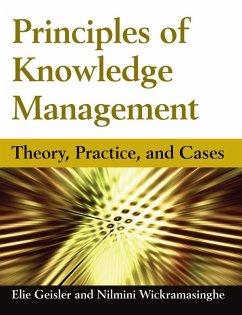Eliezer Geisler, Nilmini Wickramasinghe
Principles of Knowledge Management (eBook, ePUB)
Theory, Practice, and Cases
61,95 €
61,95 €
inkl. MwSt.
Sofort per Download lieferbar

31 °P sammeln
61,95 €
Als Download kaufen

61,95 €
inkl. MwSt.
Sofort per Download lieferbar

31 °P sammeln
Jetzt verschenken
Alle Infos zum eBook verschenken
61,95 €
inkl. MwSt.
Sofort per Download lieferbar
Alle Infos zum eBook verschenken

31 °P sammeln
Eliezer Geisler, Nilmini Wickramasinghe
Principles of Knowledge Management (eBook, ePUB)
Theory, Practice, and Cases
- Format: ePub
- Merkliste
- Auf die Merkliste
- Bewerten Bewerten
- Teilen
- Produkt teilen
- Produkterinnerung
- Produkterinnerung

Bitte loggen Sie sich zunächst in Ihr Kundenkonto ein oder registrieren Sie sich bei
bücher.de, um das eBook-Abo tolino select nutzen zu können.
Hier können Sie sich einloggen
Hier können Sie sich einloggen
Sie sind bereits eingeloggt. Klicken Sie auf 2. tolino select Abo, um fortzufahren.

Bitte loggen Sie sich zunächst in Ihr Kundenkonto ein oder registrieren Sie sich bei bücher.de, um das eBook-Abo tolino select nutzen zu können.
Presents a comprehensive introduction to the field of knowledge management. This book approaches the subject from a management rather than a highly technical point of view, and provides students with a survey of KM and its implementation in diverse organizations.
- Geräte: eReader
- mit Kopierschutz
- eBook Hilfe
- Größe: 17.65MB
Andere Kunden interessierten sich auch für
![Henry A. Abbati: Keynes' Forgotten Precursor (eBook, ePUB) Henry A. Abbati: Keynes' Forgotten Precursor (eBook, ePUB)]() Henry A. Abbati: Keynes' Forgotten Precursor (eBook, ePUB)33,95 €
Henry A. Abbati: Keynes' Forgotten Precursor (eBook, ePUB)33,95 €![Information Technology in Contemporary Organizations (eBook, ePUB) Information Technology in Contemporary Organizations (eBook, ePUB)]() Katarzyna TworekInformation Technology in Contemporary Organizations (eBook, ePUB)42,95 €
Katarzyna TworekInformation Technology in Contemporary Organizations (eBook, ePUB)42,95 €![Perspectives on Economics and Management (eBook, ePUB) Perspectives on Economics and Management (eBook, ePUB)]() Perspectives on Economics and Management (eBook, ePUB)43,95 €
Perspectives on Economics and Management (eBook, ePUB)43,95 €![Sustainable Self-Governance in Businesses and Society (eBook, ePUB) Sustainable Self-Governance in Businesses and Society (eBook, ePUB)]() Angela EspinosaSustainable Self-Governance in Businesses and Society (eBook, ePUB)33,95 €
Angela EspinosaSustainable Self-Governance in Businesses and Society (eBook, ePUB)33,95 €![Capitalizing Your Technology to Disrupt and Dominate Your Markets (eBook, ePUB) Capitalizing Your Technology to Disrupt and Dominate Your Markets (eBook, ePUB)]() Aviv Ben-YosefCapitalizing Your Technology to Disrupt and Dominate Your Markets (eBook, ePUB)30,95 €
Aviv Ben-YosefCapitalizing Your Technology to Disrupt and Dominate Your Markets (eBook, ePUB)30,95 €![Enterprise Risk Management (eBook, ePUB) Enterprise Risk Management (eBook, ePUB)]() Mirna JabbourEnterprise Risk Management (eBook, ePUB)42,95 €
Mirna JabbourEnterprise Risk Management (eBook, ePUB)42,95 €![Strategic Portfolio Management (eBook, ePUB) Strategic Portfolio Management (eBook, ePUB)]() Strategic Portfolio Management (eBook, ePUB)39,95 €
Strategic Portfolio Management (eBook, ePUB)39,95 €-
-
-
Presents a comprehensive introduction to the field of knowledge management. This book approaches the subject from a management rather than a highly technical point of view, and provides students with a survey of KM and its implementation in diverse organizations.
Dieser Download kann aus rechtlichen Gründen nur mit Rechnungsadresse in A, B, BG, CY, CZ, D, DK, EW, E, FIN, F, GR, HR, H, IRL, I, LT, L, LR, M, NL, PL, P, R, S, SLO, SK ausgeliefert werden.
Produktdetails
- Produktdetails
- Verlag: Taylor & Francis eBooks
- Seitenzahl: 400
- Erscheinungstermin: 26. März 2015
- Englisch
- ISBN-13: 9781317415152
- Artikelnr.: 42554144
- Verlag: Taylor & Francis eBooks
- Seitenzahl: 400
- Erscheinungstermin: 26. März 2015
- Englisch
- ISBN-13: 9781317415152
- Artikelnr.: 42554144
- Herstellerkennzeichnung Die Herstellerinformationen sind derzeit nicht verfügbar.
Eliezer Geisler, Nilmini Wickramasinghe
These essays on Post-Keynesian economics were written expressly for a
volume to honour the life and work of Alfred Eichner. The original
countributions - that critically examine and extend ideas in Eichner's "The
Macrodynamics of Advanced Market Economies" are organized in seven sections
that correspond to areas of economics in which Eichner made a significant
contribution. Part 1 deals with the megacorp, a theory of firm pricing and
investment that was one of Eichner's most important contributions. Issues
of productivity and technical change, that lie at the center of Eichner's
macrodynamic model, are the focus of part 1 and parts 3 and 4 elaborate on
Eichner's work on growth and money and yield insights into the theoretical
disagreements among the Post-Keynesians themselves. Part 5 presents a
number of examples of non-neo-classical model building. Part 6 opens with a
critique of the "new economic history" that leads to other essays on thorny
methodological issues confronting Post-Keynesians. Part 7 gives a European
perspective on North American Post-Keynesian economics. The essays reveal
the relationships between Eichner's work and Institutionalist and Marxian
economics. At the same time, the book raises current theoretical conflicts
among these groups as well as among Post-Keynesians themselves. This book
compliments Alfred S.Eichner's "The Macrodynamics of Advanced Market
Economies", also published in 1991, and is appropriate for scholars and
upper-level undergraduates and graduate students.
volume to honour the life and work of Alfred Eichner. The original
countributions - that critically examine and extend ideas in Eichner's "The
Macrodynamics of Advanced Market Economies" are organized in seven sections
that correspond to areas of economics in which Eichner made a significant
contribution. Part 1 deals with the megacorp, a theory of firm pricing and
investment that was one of Eichner's most important contributions. Issues
of productivity and technical change, that lie at the center of Eichner's
macrodynamic model, are the focus of part 1 and parts 3 and 4 elaborate on
Eichner's work on growth and money and yield insights into the theoretical
disagreements among the Post-Keynesians themselves. Part 5 presents a
number of examples of non-neo-classical model building. Part 6 opens with a
critique of the "new economic history" that leads to other essays on thorny
methodological issues confronting Post-Keynesians. Part 7 gives a European
perspective on North American Post-Keynesian economics. The essays reveal
the relationships between Eichner's work and Institutionalist and Marxian
economics. At the same time, the book raises current theoretical conflicts
among these groups as well as among Post-Keynesians themselves. This book
compliments Alfred S.Eichner's "The Macrodynamics of Advanced Market
Economies", also published in 1991, and is appropriate for scholars and
upper-level undergraduates and graduate students.
These essays on Post-Keynesian economics were written expressly for a
volume to honour the life and work of Alfred Eichner. The original
countributions - that critically examine and extend ideas in Eichner's "The
Macrodynamics of Advanced Market Economies" are organized in seven sections
that correspond to areas of economics in which Eichner made a significant
contribution. Part 1 deals with the megacorp, a theory of firm pricing and
investment that was one of Eichner's most important contributions. Issues
of productivity and technical change, that lie at the center of Eichner's
macrodynamic model, are the focus of part 1 and parts 3 and 4 elaborate on
Eichner's work on growth and money and yield insights into the theoretical
disagreements among the Post-Keynesians themselves. Part 5 presents a
number of examples of non-neo-classical model building. Part 6 opens with a
critique of the "new economic history" that leads to other essays on thorny
methodological issues confronting Post-Keynesians. Part 7 gives a European
perspective on North American Post-Keynesian economics. The essays reveal
the relationships between Eichner's work and Institutionalist and Marxian
economics. At the same time, the book raises current theoretical conflicts
among these groups as well as among Post-Keynesians themselves. This book
compliments Alfred S.Eichner's "The Macrodynamics of Advanced Market
Economies", also published in 1991, and is appropriate for scholars and
upper-level undergraduates and graduate students.
volume to honour the life and work of Alfred Eichner. The original
countributions - that critically examine and extend ideas in Eichner's "The
Macrodynamics of Advanced Market Economies" are organized in seven sections
that correspond to areas of economics in which Eichner made a significant
contribution. Part 1 deals with the megacorp, a theory of firm pricing and
investment that was one of Eichner's most important contributions. Issues
of productivity and technical change, that lie at the center of Eichner's
macrodynamic model, are the focus of part 1 and parts 3 and 4 elaborate on
Eichner's work on growth and money and yield insights into the theoretical
disagreements among the Post-Keynesians themselves. Part 5 presents a
number of examples of non-neo-classical model building. Part 6 opens with a
critique of the "new economic history" that leads to other essays on thorny
methodological issues confronting Post-Keynesians. Part 7 gives a European
perspective on North American Post-Keynesian economics. The essays reveal
the relationships between Eichner's work and Institutionalist and Marxian
economics. At the same time, the book raises current theoretical conflicts
among these groups as well as among Post-Keynesians themselves. This book
compliments Alfred S.Eichner's "The Macrodynamics of Advanced Market
Economies", also published in 1991, and is appropriate for scholars and
upper-level undergraduates and graduate students.







